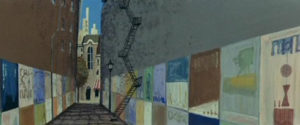Tales of a Street Corner (Anime)
Also known as ある街角の物語 (Aru Machikado no Monogatari)
| English Title: | Tales of a Street Corner |
| In English? | N/A |
| Japanese Title: | ある街角の物語 [Aru Machikado no Monogatari] |
| Type: | Experimental Anime |
| Originally Screened: | 1962/11/05 |
| Location: | 1st Screening of Mushi Productions Work |
| Length: | 38 min. (Colour) |
Tezuka’s first foray into experimental animated shorts, Tales of a Street Corner (1962) was first screened at Mushi Productions inaugural company presentation held at at the Yamaha Hall in Ginza on November 5, 1962. It was shown alongside the first episode the original Black & White Astro Boy (1963-66) and Male (1962).
What it’s about
The drama in Tales of a Street Corner (1962) unfolds on a certain street corner, and the story features a mixture of animate creatures and inanimate objects – a girl who has lost her teddy bear, a group of posters, some mice, a street lamp, and a playful moth that is drawn to the light – each with their own intersecting dramatic elements. At first whimsical and playful, the tone suddenly changes as a military regime (represented by the posters) comes to power and turns even their small part of the world to war, ultimately to tragic consequence. Yet, despite the devastation, their remains hope in both the power of nature to heal and the resiliency of the human spirit.
What you should know
As with most of his experimental works, Tales of a Street Corner (1962) is much more about expressing Tezuka’s personal feelings than telling a particular story – and in this case his anti-war themes come through loud and clear. Freed from the shackles of needing to produce commercially viable content, Tezuka felt the freedom to express his inner most thoughts through his animation. This work shows us that even something as simple as a poster on a wall, on any random street corner can have serious dramatic gravitas if only you have the vivid imagination and the magic of animation to bring it alive.
Shortly after Mushi Productions’ animation division was established, Tezuka decided he wanted to produce a medium-length experimental animation film that would become known as Tales of a Street Corner (1962). Production began in September 1962, only one month after the bulk of the team was put to task to get the original Black & White Astro Boy (1963-66) off the ground. The project to produce a 39-minute, CinemaScope lyrical animated film was put under the joint direction of Yamamoto Eichi and Sakamoto Yusaku – with Tezuka acting primarily as the Executive Producer responsible for the original idea and story. Given the financial realities and limited budget of the fledgling company, efforts were needed to limit the amount of cells in the production, so it was decided that posters and other inanimate objects were to be used as characters – albeit extremely creatively and to wonderful effect.
After the project was completed in October 1962 Mushi Productions held a special presentation at the Yamaha Hall in Ginza on November 5, 1962 in order to showcase their work to a public audience. As such, Tales of a Street Corner (1962) was shown alongside another experimental short, Male (1962) and the first episode the original Black & White Astro Boy (1963-66) television series.In recognition of the artistic achievement, Tales of a Street Corner (1962) went on to win the First Ofuji Award at the 1962 Mainichi Film Contest, the 17th National Arts Festival Encouragement Award as well as the 13th Blue Ribbon Educational and Cultural Film Award.
Production Staff
Original Plan, Story line and Executive Producer: Tezuka Osamu
Direction: Yamamoto Eichi, Sakamoto Yusaku
Music: Takai Tatsuo
Art: Arai Ryo
Original Pictures: Yamamoto Eichi, Sakamoto Yusaku, Konno Shuji, Sugii Gizaburo, Ishii Motoaki, and Nakamura Kazuko
Animation: Hayashi Shigeyuki, Yamamoto Shigeru, Sakurai Yurio, Nogi Ikuo, Numamoto Kiyomi, Miura Tsunako, Mitsuyama Katsuji
Finishing: Shirakawa Seiko, Matsumoto Kazuko, Watanabe Chizuko, Shindo Yaeko, Ono Shizuko, Tsuruta Toshiko, Matsumoto Setsuko, Matsumoto Futaba, Ouchi Mitsuko
Backgrounds: Hanto Katsumi, Owaki Shoko
Camera: Hirokawa Kazuyuki, Sakura Noriyuki
Editing: Yamamoto Eichi
Recording: Ota Chisato, Miyamoto Takashi
Manager: Kawabata Eichi
Clerical Work: Imai Yoshiaki, Akiyama Kikue
Music Performance: Mushi Pro Symphonic Orchestra
Effects: Izumi Shiro



